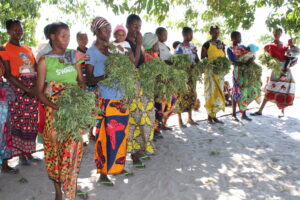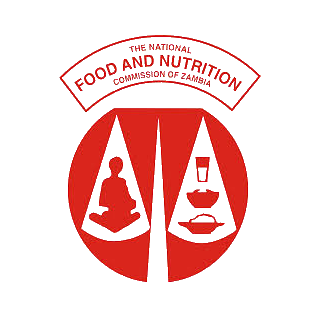By Benny Munyama
 Involvement of the Ministry of Agriculture in the SUN II Project is yielding positive results in Kalabo District, Western Province. The ministry distributed the nutrient rich orange-fleshed sweet potato vines in response to household complaints of scarcity of vines and resultant tubers in their diet.
Involvement of the Ministry of Agriculture in the SUN II Project is yielding positive results in Kalabo District, Western Province. The ministry distributed the nutrient rich orange-fleshed sweet potato vines in response to household complaints of scarcity of vines and resultant tubers in their diet.
“We are grateful to the Ministry of Agriculture and everyone else who partnered with them to handover to us these orange-fleshed sweet potato vines which have helped us tremendously,” were the words of gratitude from Sholo Bishoni, aged 29, a beneficiary in Kapulanga Village, Chief Malala’s area in Sihole.
Through this distribution, target households with nutrition related challenges were given the capacity to improve their dietary diversity. The SUN II lead farmers who have been championing community-based multiplication of orange-fleshed sweet potatoes vines have successfully conducted the pass-on to follower farmers who are also either lactating or pregnant mothers.
Sholo Bishoni is a mother of three children, with one of them falling within the first most critical 1000 days of human life, and she is pleased to have benefitted from the pass-on initiative implemented by the Ministry of Agriculture.
“I am a single mother, giving care to three children who require adequate nutrients in their diet. So, the orange-fleshed sweet potato tubers and leaves serve as an opportune source of vitamin A and household income when I sell the produce. It is keeping us food secure.”
Ms. Bishoni has encouraged other beneficiaries who have benefitted from the pass-on to manage the vines with a foresight that more households need to benefit from this initiative.
“We need to be serious and reciprocate this gesture by producing more vines and tubers, enough to feed our households and then sell the excess to earn an income to buy other household requirements. If others did it for us, we too can do it for the next group.”
It all started with Rhoda Kalimbwe-Limbuti, aged 50, a smallholder lead farmer in Sihole area of Kandambo ward, who received a bag of orange-fleshed sweet potato vines from the Ministry of Agriculture’s initiative. Ms Kalimbwe is also a caretaker of three children who are below the age of 2 years. She, like many smallholder farmers, could not have access to a reliable and cost-effective supply of the nutrient rich orange-fleshed sweet potato vines. I’m in charge of 10 SUN II beneficiaries two of whom are pregnant while 8 are breastfeeding mothers. I received a bag of orange-fleshed sweet potato vines. The vines could only be enough to make four beds, so I needed to multiply them in order to cater for every target beneficiary. With good management, multiplication of the vines has been possible,” narrates Ms Kalimbwe.
Through her focus, determination and hard work, Ms Kalimbwe has managed to advocate for community involvement in growing and multiplying the vines, for onward handover to 10 follower farmers who are also SUN II beneficiaries under her charge. She has explained that these vines are beneficial to both pregnant and lactating mothers due to their rich nutrients.
“I started with only four beds and managed to maintain them, with the help of the 10 follower farmers under SUN II project. We multiplied them to 14 beds which are being used for the pass-on to 10 Nutrition Support Groups (NSG) in Kandambo ward.”
The beneficiaries are happy with the community-based initiative which is aimed at improving dietary diversity and reduce nutrition related diseases caused by lack of vitamin A among the targeted households. They are also hopeful that the orange-fleshed sweet potato vines and tubers thereof will contribute to a food based approach towards promoting food security and supplement as an alternative staple food among vulnerable households.
District Nutrionist, Mercy Ndaba, explains that “orange-fleshed sweet potatoes have a lot of health benefits including the provision of Pro-Vitamin A which boosts the immune system, improves vision, and helps gain weight as it provides carbohydrates in form of starch. The vines provide iron, vitamin A and other micronutrients. Iron is important because it prevents anemia.”
She has noted that “to ensure children are provided with all the important nutrients, it’s important that the locally produced foods are utilized because these foods are easily accessed and affordable compared to buying foods from outside our communities. Mothers should ensure that they provide recipes that incorporate both micro and macro nutrients.”
District Nutrition Support Coordinator Inonge Nosiku is elated with the community-based multiplication of orange-fleshed sweet potatoes vines. Ms Nosiku is optimistic that the initiative will positively contribute to the fight against malnutrition because both pregnant and lactating mothers will benefit from the crop’s rich nutrients either as a vegetable or staple food. She has noted that orange-fleshed sweet potato vines are a must have for every target household’s backyard garden, especially those with children within the first most critical 1000 days of human life because the vines are easy to manage, need less water and implements, and climate resilient.


